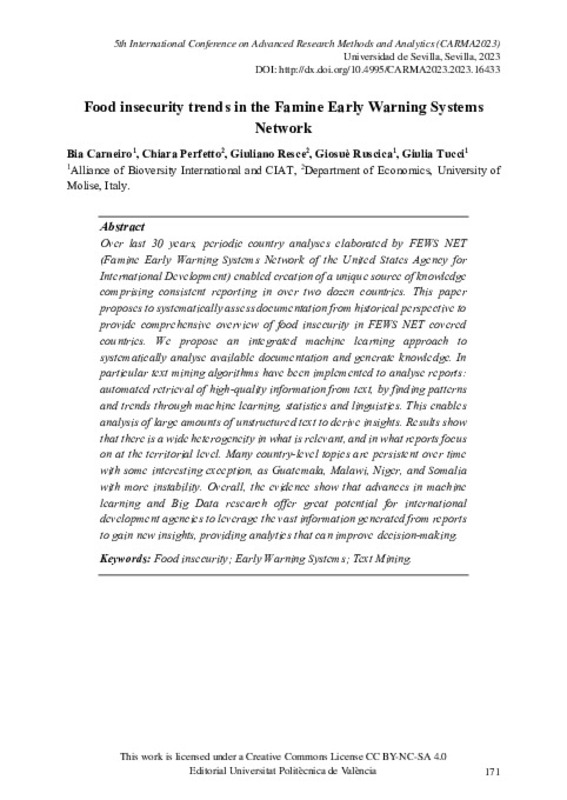JavaScript is disabled for your browser. Some features of this site may not work without it.
Buscar en RiuNet
Listar
Mi cuenta
Estadísticas
Ayuda RiuNet
Admin. UPV
Food insecurity trends in the Famine Early Warning Systems Network
Mostrar el registro sencillo del ítem
Ficheros en el ítem
| dc.contributor.author | Carneiro, Bia
|
es_ES |
| dc.contributor.author | Perfetto, Chiara
|
es_ES |
| dc.contributor.author | Resce, Giuliano
|
es_ES |
| dc.contributor.author | Ruscica, Giosuè
|
es_ES |
| dc.contributor.author | Tucci, Giulia
|
es_ES |
| dc.date.accessioned | 2024-01-11T12:18:33Z | |
| dc.date.available | 2024-01-11T12:18:33Z | |
| dc.date.issued | 2023-09-22 | |
| dc.identifier.isbn | 9788413960869 | |
| dc.identifier.uri | http://hdl.handle.net/10251/201788 | |
| dc.description.abstract | [EN] Over last 30 years, periodic country analyses elaborated by FEWS NET (Famine Early Warning Systems Network of the United States Agency for International Development) enabled creation of a unique source of knowledge comprising consistent reporting in over two dozen countries. This paper proposes to systematically assess documentation from historical perspective to provide comprehensive overview of food insecurity in FEWS NET covered countries. We propose an integrated machine learning approach to systematically analyse available documentation and generate knowledge. In particular text mining algorithms have been implemented to analyse reports: automated retrieval of high-quality information from text, by finding patterns and trends through machine learning, statistics and linguistics. This enables analysis of large amounts of unstructured text to derive insights. Results show that there is a wide heterogeneity in what is relevant, and in what reports focus on at the territorial level. Many country-level topics are persistent over time with some interesting exception, as Guatemala, Malawi, Niger, and Somalia with more instability. Overall, the evidence show that advances in machine learning and Big Data research offer great potential for international development agencies to leverage the vast information generated from reports to gain new insights, providing analytics that can improve decision-making. | es_ES |
| dc.format.extent | 8 | es_ES |
| dc.language | Inglés | es_ES |
| dc.publisher | Editorial Universitat Politècnica de València | es_ES |
| dc.relation.ispartof | 5th International Conference on Advanced Research Methods and Analytics (CARMA 2023) | |
| dc.rights | Reconocimiento - No comercial - Compartir igual (by-nc-sa) | es_ES |
| dc.subject | Food insecurity | es_ES |
| dc.subject | Early Warning Systems | es_ES |
| dc.subject | Text Mining | es_ES |
| dc.title | Food insecurity trends in the Famine Early Warning Systems Network | es_ES |
| dc.type | Capítulo de libro | es_ES |
| dc.type | Comunicación en congreso | es_ES |
| dc.identifier.doi | 10.4995/CARMA2023.2023.16433 | |
| dc.rights.accessRights | Abierto | es_ES |
| dc.description.bibliographicCitation | Carneiro, B.; Perfetto, C.; Resce, G.; Ruscica, G.; Tucci, G. (2023). Food insecurity trends in the Famine Early Warning Systems Network. Editorial Universitat Politècnica de València. 171-178. https://doi.org/10.4995/CARMA2023.2023.16433 | es_ES |
| dc.description.accrualMethod | OCS | es_ES |
| dc.relation.conferencename | CARMA 2023 - 5th International Conference on Advanced Research Methods and Analytics | es_ES |
| dc.relation.conferencedate | Junio 28-30, 2023 | es_ES |
| dc.relation.conferenceplace | Sevilla, España | es_ES |
| dc.relation.publisherversion | http://ocs.editorial.upv.es/index.php/CARMA/CARMA2023/paper/view/16433 | es_ES |
| dc.description.upvformatpinicio | 171 | es_ES |
| dc.description.upvformatpfin | 178 | es_ES |
| dc.type.version | info:eu-repo/semantics/publishedVersion | es_ES |
| dc.relation.pasarela | OCS\16433 | es_ES |








